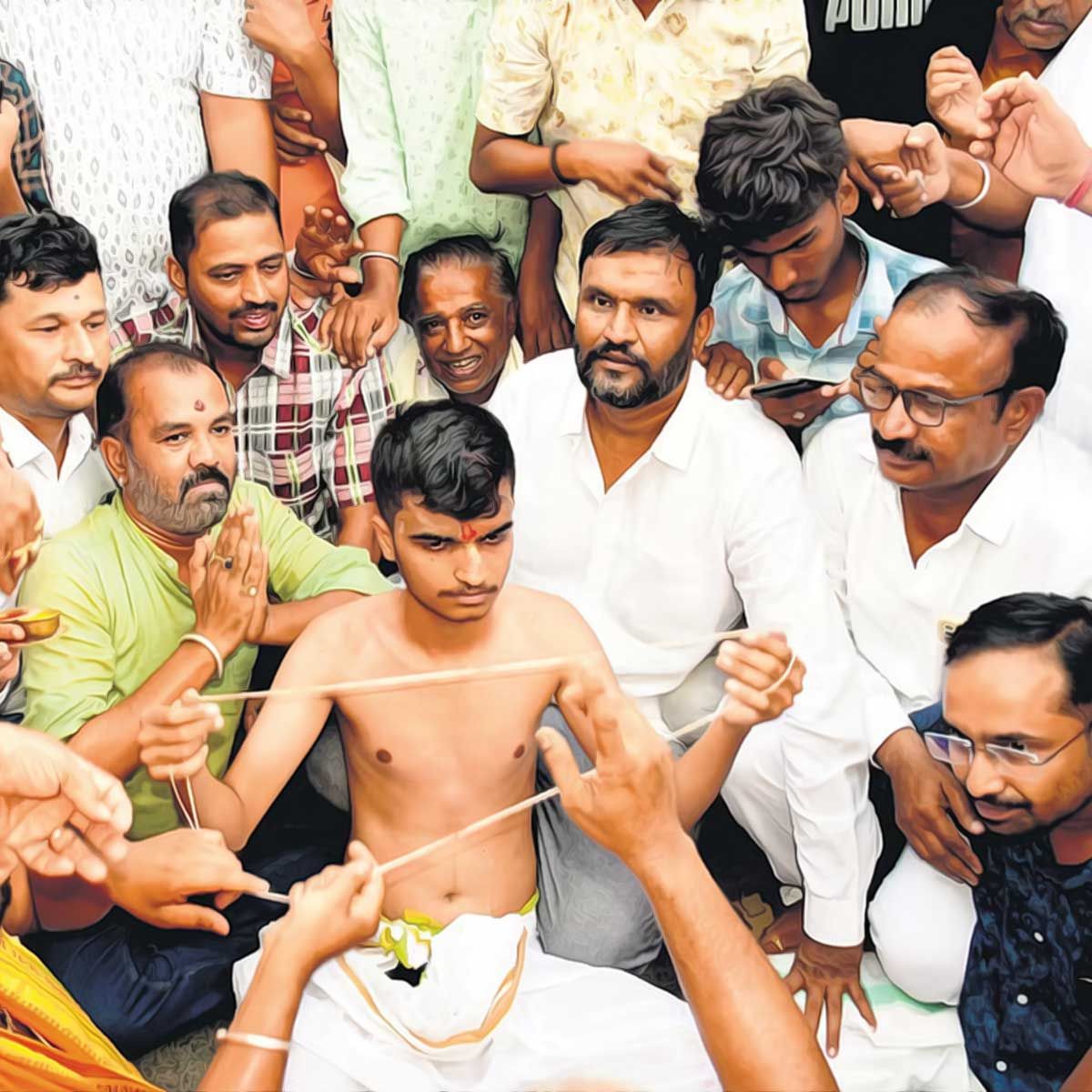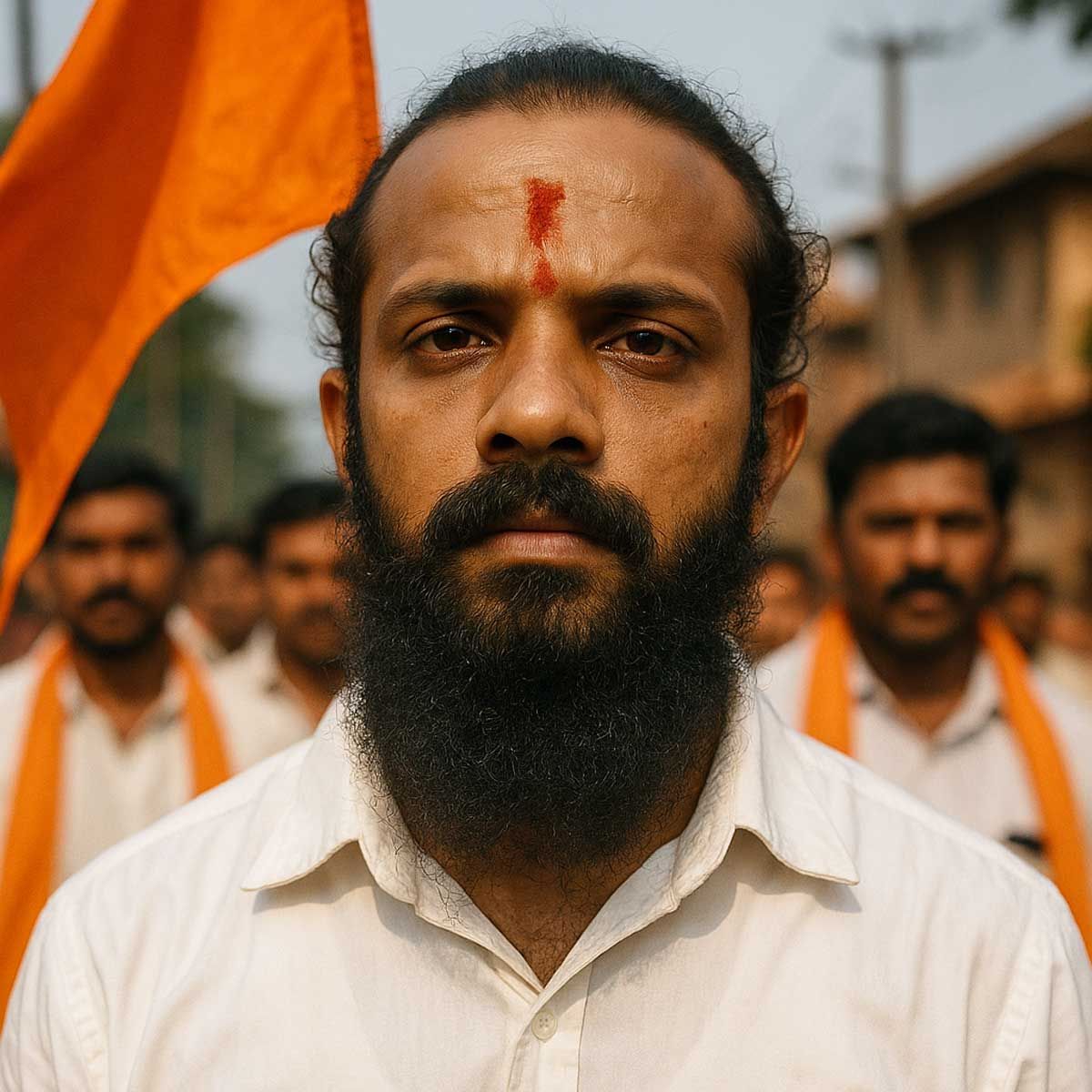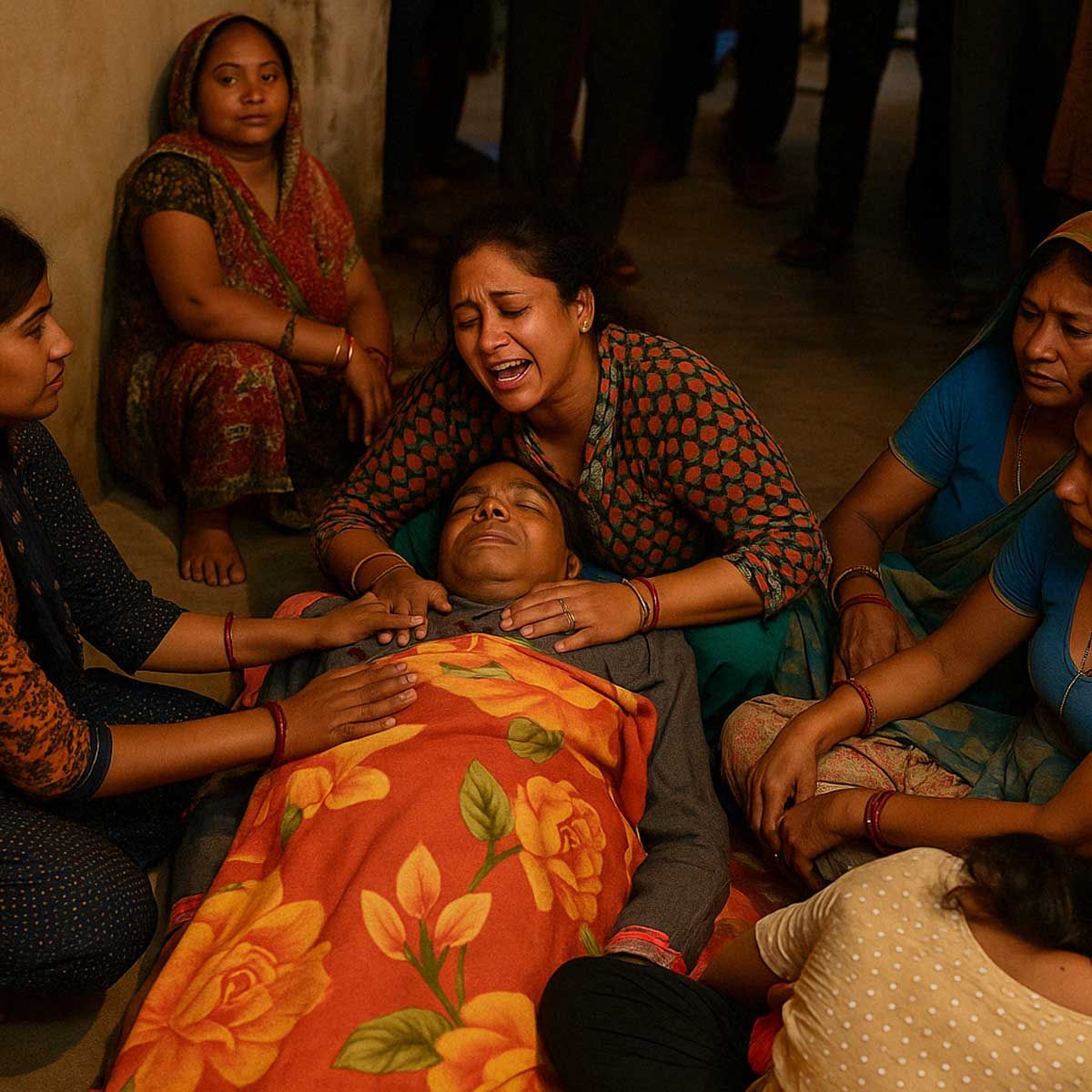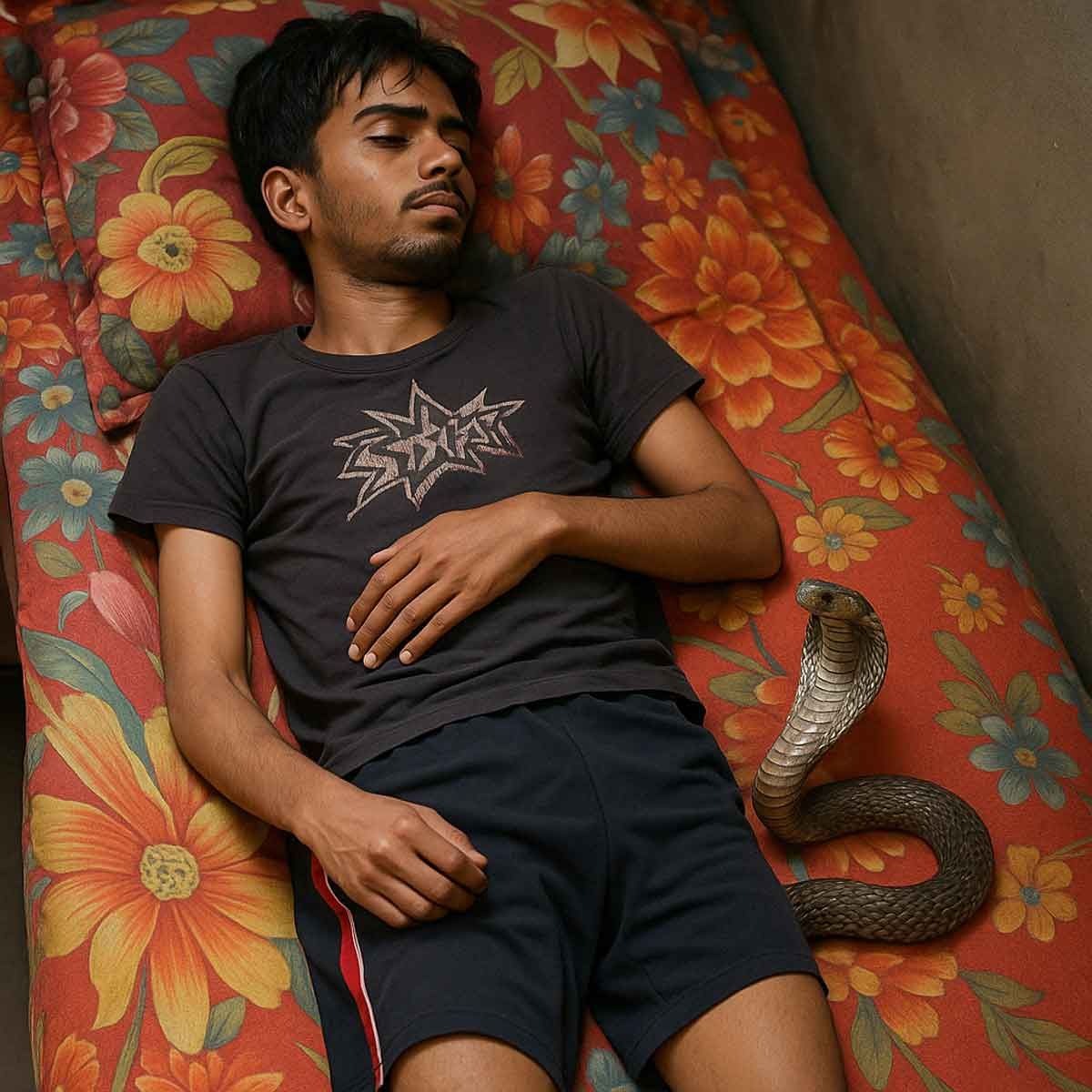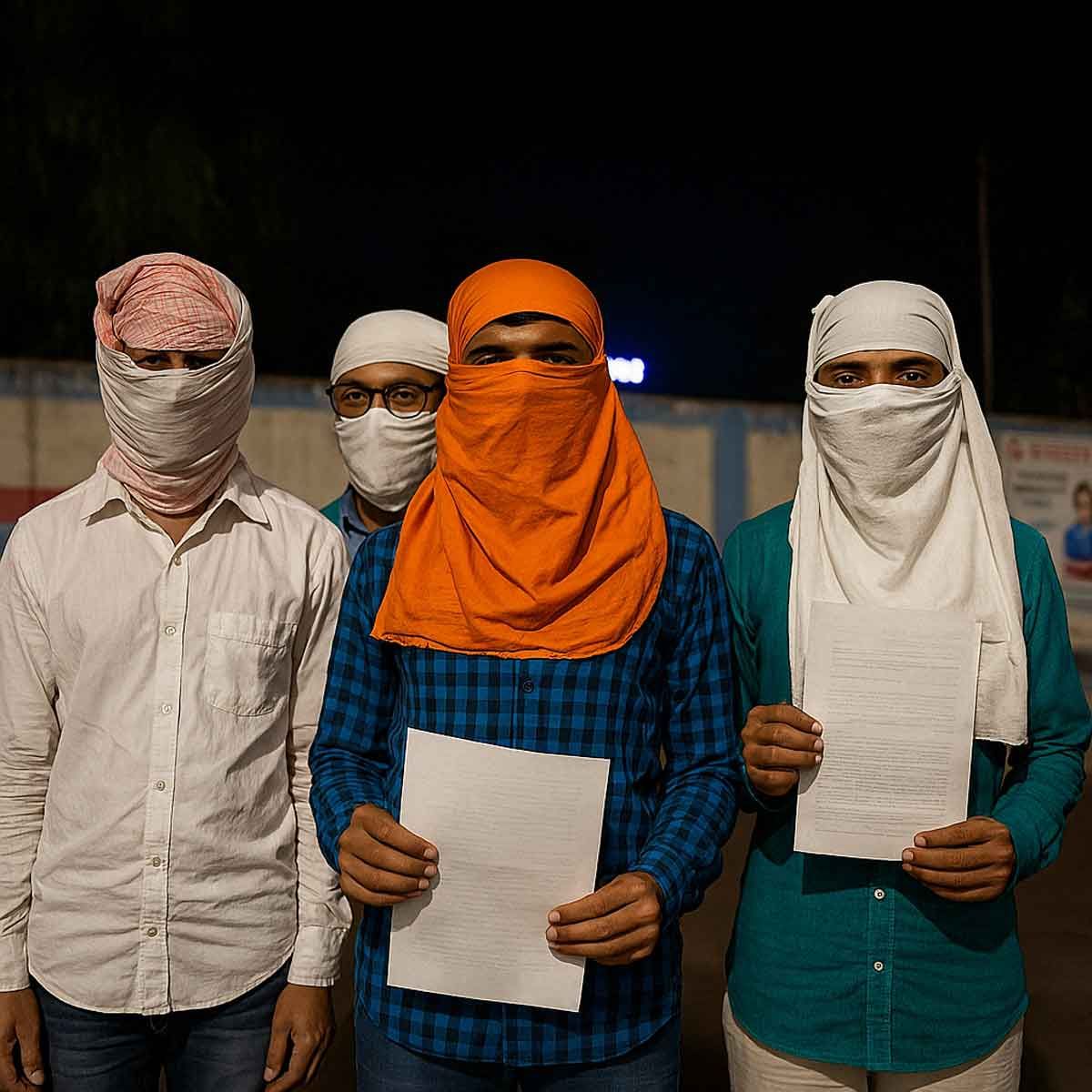More Coverage
Twitter Coverage
Satyaagrah
Written on
Satyaagrah
Written on
Satyaagrah
Written on
Satyaagrah
Written on
Satyaagrah
Written on
JOIN SATYAAGRAH SOCIAL MEDIA
In a sweeping crackdown, Delhi's CBI unearthed a horrifying child trafficking ring, rescuing two newborns and arresting culprits, revealing a post-pandemic surge in child exploitation that has mobilized heroic rescue operations across India's heartland

In a significant operation on Friday, the Central Bureau of Investigation (CBI) conducted several raids throughout Delhi, focusing on cracking down suspected child trafficking networks. In one of the raids, officials made a heart-wrenching discovery in Keshav Puram: two newborn babies were rescued from a location suspected to be involved in illegal activities. This information was first brought to light by ANI, a reputable news agency.
|
|
The CBI's intervention led to the immediate rescue of these vulnerable infants, highlighting the grim reality of child trafficking. Following the successful rescue, the CBI detained a number of individuals for further questioning to unravel the network behind this illicit trade. Among the detainees was a woman who is believed to be involved in selling the children, alongside another individual who is accused of purchasing them. These detentions are crucial as they represent the first step in bringing those responsible to justice.
The ongoing interrogation of these suspects is part of a larger effort to expose the complexities of the child trafficking ring. The CBI's prompt action not only saved the newborns but also signifies a breakthrough in the fight against child trafficking. As the rescued babies are now under the safe custody of the authorities, the focus shifts to the broader implications of this operation.
The operation in Keshav Puram is just the tip of the iceberg, as the authorities believe it could be part of a larger network involved in the nefarious trade of buying and selling innocent lives. While specific details about the extent of this trafficking ring and the identities of all individuals involved are yet to be fully disclosed, the CBI is actively working on the case. The public and media are keenly awaiting further revelations as the investigation progresses, hoping for a swift and comprehensive resolution to protect more children from such heinous crimes.
|
On 28th February this year a Newborn trafficking racket was busted: Cops nabbed 8 from Delhi, Punjab
On the 28th of February, a significant operation led to the busting of a newborn trafficking racket, with police arresting eight individuals, inclusive of five women, across Delhi and Punjab. These arrests brought to light the grim reality of a network engaged in the buying and selling of newborn children, spanning several states.
The law enforcement's timely intervention allowed for the rescue of a newborn baby, who was just 10 to 15 days old, marking a small yet poignant victory against the backdrop of this dark trade.
The arrested individuals were identified, with the men being named as Piyush Aggarwal, Rajinder, and Raman. On the female side, two hailed from Delhi, and three from Punjab, as confirmed by the police. These arrests paint a picture of a widespread network operating across state lines, involved in the egregious act of child trafficking.
In a detailed exposition by DCP (Rohini) Guriqbal Singh Sidhu, it was revealed how the operation unfolded. On February 20, following a PCR call at Begumpur police station, allegations surfaced regarding the trading of babies in the locality. DCP Sidhu narrated, “A police team immediately reached the given address and verified the facts… we came to know that two women were in the house along with a newborn girl.”
|
The subsequent interrogation of these women at the site led to chilling revelations. Initially, they faltered in explaining the child's presence, but persistent questioning unveiled their dark secret. “During enquiry, they could not give a satisfactory response about the parentage of the child. On sustained questioning, they disclosed that they operate an interstate human trafficking gang that buys and sells newborns in different states of Northern India. They said the baby girl in question was purchased from Muktsar in Punjab for Rs 50,000,” DCP Sidhu reported.
The investigation into the newborn trafficking racket revealed more disturbing details as the officer in charge disclosed the calculated operations of the perpetrators. The women caught in the raid were evidently strategizing, “waiting for the right buyer” for their nefarious transactions. Consequently, the authorities initiated legal proceedings, registering a case under relevant sections of the Indian Penal Code (IPC) for criminal conspiracy and the Juvenile Justice Act, reflecting the serious nature of the crimes involved.
Delhi Police's Deputy Commissioner (DCP) provided deeper insights into the case, noting, “During questioning, the women also revealed names of their other gang members.” This led to expanded investigations and subsequent raids across Punjab, resulting in the arrest of six additional suspects, including three women, thereby dismantling a larger part of the trafficking network.
Among those arrested, one woman from Delhi had a history of involvement in such criminal activities, previously being under the radar of the Delhi Police Crime Branch for human trafficking charges. This detail underscores the recurring involvement of certain individuals in these heinous crimes and the persistent challenge law enforcement faces in curbing such activities.
A senior police officer shed light on the transactional aspects of this illegal operation, indicating that infants were sold to "final clients" through a middleman or facilitator, who remains at large. “They had sold another child on February 10 who was around the same age… we are trying to trace the child’s whereabouts and who the seller was… the clients are mostly based in Delhi-NCR,” the officer elaborated, highlighting the ongoing efforts to track down and rescue the victims of this trafficking ring. The price range for these illegal sales astonishingly reached between Rs 10 to 15 lakh, emphasizing the lucrative yet illicit nature of this trade.
|
Delhi saw 68% surge in child trafficking after pandemic
The disturbing reality of child trafficking in India's capital is brought to light in a comprehensive report by Games24x7 and the Kailash Satyarthi Children's Foundation (KSCF). This study, focusing on the aftermath of the Covid-19 pandemic, paints a troubling picture: Delhi has experienced a 68% surge in cases of child trafficking. The situation is even more dire in Uttar Pradesh, where there has been a nearly six-fold increase in such incidents. These figures starkly illustrate the escalating crisis of child trafficking in these regions.
The "Child Trafficking in India" report elaborates on the grim status of Delhi as a focal point for this illegal trade. Alarmingly, more than a quarter of the children rescued from trafficking networks were from Delhi, highlighting the city’s role as a central hub in the child trafficking landscape. This situation underscores the pressing issue of child exploitation in the national capital, with a significant number of minors being swept up into these criminal activities.
A closer look at the industry sectors reveals the prevalent areas of child labor exploitation. The hospitality sector, including hotels and dhabas, emerges as a leading domain where trafficked children are found working, accounting for 15.6% of such labor. This is followed by family-owned automobile or transport units, representing 13% of the child labor force, and the garment industry, which employs 11.18% of these children. These statistics show the varied sectors where trafficked children are forced into labor, often under hazardous and exploitative conditions.
Moreover, the report sheds light on the geographical spread of this issue, noting that five of the top 10 districts identified for child trafficking are in Delhi itself. This localizes the problem significantly within the city's boundaries. Furthermore, the states of Bihar, Uttar Pradesh, and Andhra Pradesh are identified as the major sources for trafficked children, indicating a broader network of child trafficking extending across state lines.
This comprehensive analysis of child trafficking trends post-pandemic in India reveals a stark increase in the practice, particularly in urban centers like Delhi, marking it as a critical area for intervention and action to protect vulnerable children from exploitation and abuse.
The comprehensive study conducted by Games24x7's data science team, in collaboration with the Kailash Satyarthi Children's Foundation (KSCF) and its partners, sheds light on the child trafficking crisis in India. This analysis spanned 262 districts across 21 states from 2016 to 2022, providing a detailed overview of the situation.
The findings are alarming: a total of 13,549 children under the age of 18 were rescued during this period. These children, unfortunately, found themselves in industries notorious for employing child labor. Hotels and dhabas top the list, employing 15.6% of these children, followed closely by family-owned automobile or transport units with 13%, and the garments sector at 11.18%. This data not only identifies the sectors most culpable in exploiting child labor but also emphasizes the magnitude of this issue.
A significant age group among these exploited children is those between 13 to 17 years old, making up 80% of the total number rescued. This statistic is further illustrated by a recent operation where 16 children, all within this age range, were rescued. This successful raid was a combined effort by the Bachpan Bachao Andolan and the local police, led by the SDM of Vasant Vihar with assistance from the NGO Bal Vikas Dhara. The operation resulted in the sealing of twelve establishments involved in exploiting these young lives.
The origins of these rescued child laborers are predominantly Bihar and Uttar Pradesh, with some coming from Nepal. This geographical spread highlights the cross-border nature of child trafficking and labor exploitation, pointing to the complex and extensive networks that facilitate such heinous activities.
This detailed data compilation and subsequent interventions demonstrate the ongoing struggle against child trafficking and labor exploitation in India and neighboring regions. These efforts are crucial in dismantling the structures that perpetuate child labor and ensuring the safety and well-being of vulnerable children.
 |
 Support Us
Support Us
Satyagraha was born from the heart of our land, with an undying aim to unveil the true essence of Bharat. It seeks to illuminate the hidden tales of our valiant freedom fighters and the rich chronicles that haven't yet sung their complete melody in the mainstream.
While platforms like NDTV and 'The Wire' effortlessly garner funds under the banner of safeguarding democracy, we at Satyagraha walk a different path. Our strength and resonance come from you. In this journey to weave a stronger Bharat, every little contribution amplifies our voice. Let's come together, contribute as you can, and champion the true spirit of our nation.
 |  |  |
| ICICI Bank of Satyaagrah | Razorpay Bank of Satyaagrah | PayPal Bank of Satyaagrah - For International Payments |
If all above doesn't work, then try the LINK below:
Please share the article on other platforms
DISCLAIMER: The author is solely responsible for the views expressed in this article. The author carries the responsibility for citing and/or licensing of images utilized within the text. The website also frequently uses non-commercial images for representational purposes only in line with the article. We are not responsible for the authenticity of such images. If some images have a copyright issue, we request the person/entity to contact us at This email address is being protected from spambots. You need JavaScript enabled to view it. and we will take the necessary actions to resolve the issue.
Related Articles
- "In unity there is strength; in partnership, there's power": India-UAE economic alliance marks turning point in their shared history, CEPA to boost trade, stimulate investments & fortify economies, advancing both nations towards mutual growth & prosperity
- A fascinating legend of the ethereal Indian cotton which led to Rome losing a significant quantity of its wealth to India
- "We should keep on going along the path of globalization. Globalization is good... when trade stops, war comes": India-UAE to carry out bilateral trade in their national currencies, will help two-way trade reach $100 billion mark in more than five years
- "It is not titles that honor men, but men that honor titles": Aurangzeb Lane in Lutyen Delhi renamed as Dr APJ Abdul Kalam Lane, it is not just a change of signboards but a symbolic shift in the narrative of India's history, celebrating illustrious legacy
- "Politics - The land of embarrassment, breakfast and inauguration": Massive embarrassment faced by Kejriwal at GGSIPU East Delhi inauguration, AAP was claiming credit for this building where foundation was laid by Smriti Irani and inaugurated by LG Saxena
- 'Anti-Hindu Delhi riot was remotely supervised by Umar Khalid just like 9/11 conspirators,’ prosecutors oppose Khalid’s bail plea, says 'Riot key conspirators were like entertainers who resorted to damrubaazi to attract crowd'
- Delhi HC Justice says, "not that the financial frauds run into thousands of crores, they are just 10-12 crores and she has old parents here": Donation fraud accused Rana Ayyub allowed by HC to travel abroad
- "They want your children": Episcopal Church officially embraces sex changes for children of 'all ages' and endorses medical treatments for minors, such as puberty blockers, hormone therapy, and transition surgery, which normally is considered "child abuse
- NDMC to bulldoze “illegal encroachments” in Delhi's Jahangirpuri where riots broke out against Hindu devotees: Tukde tukde gang supporter AAP’s Amanatulah Khan says ‘attempt to disrupt peace during Ramzan’
- Charges framed against Tahir Hussain by Delhi Court for Delhi Anti-Hindu riots 2020: 5 accomplices, active participant, used own house for throwing stone, patrol bombs etc., elaborate preparations to target Hindus
- G20 Summit at Bharat Mandapam unveils India's profound legacy through Panini's 'Ashtadhyayi', the majestic Konark Wheel, ancient arts and more, a riveting testament to India's rich history, a beacon of cultural synergy and global unity in modern times
- "जलवा-ए-हुस्न": IAS Tina Dabi’s raid in Barmer uncovered illegal spa activities, prostitution and blackmailing, leading to the arrest of two men and five women, finally addressing locals’ long-standing complaints of immoral conduct in residential areas
- "G20 New Delhi Leaders' Declaration" released post-consensus at the summit unveils a unified vision: "One Earth, One Family, One Future", Global leaders pledge to usher in a green, inclusive, and resilient future, highlighting India's contributions
- "अर्श से फ़र्श तक": Once celebrated as an organic farming advocate on Pasumai Vikatan, Victor James Raja's dramatic fall came after a revealing email to PMO led the CBI to discover his heinous child abuse crimes in Thanjavur, resulting in a life sentence
- "A one-man global protest": Trudeau fails in rallying allies against Modi Govt over Khalistani support; Five Eyes nations prioritize relations with India, dismissing his claims and continuing strategic partnerships, signaling 'move on' diplomatically















